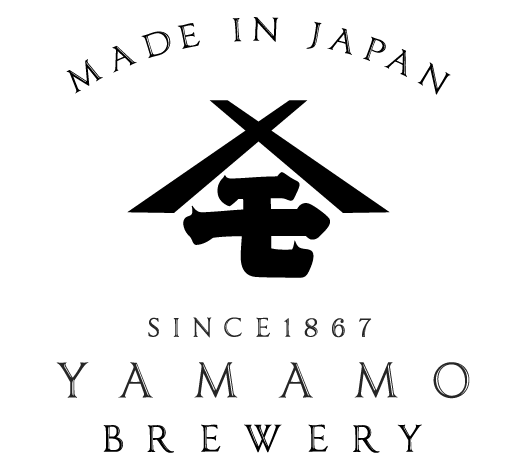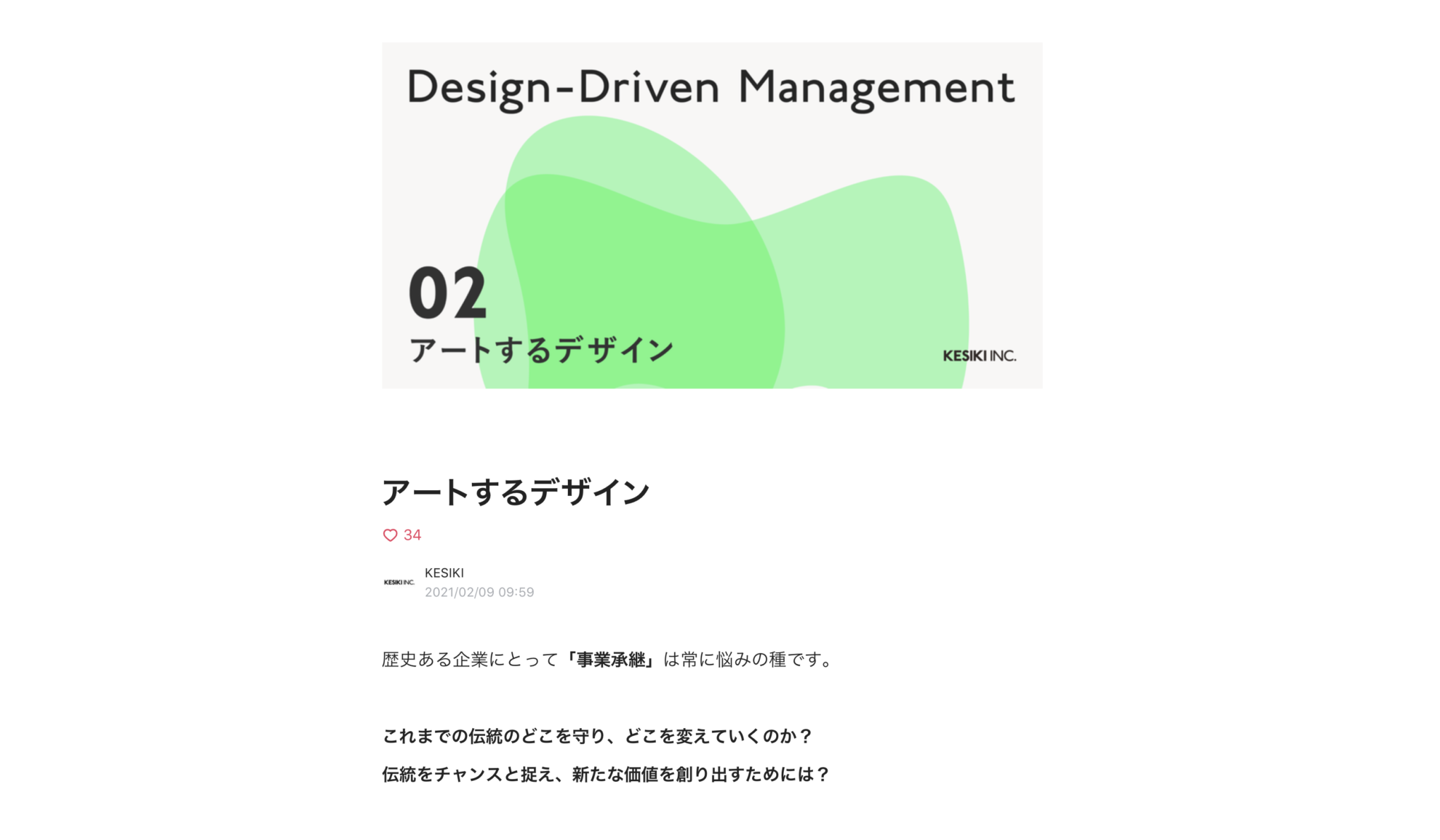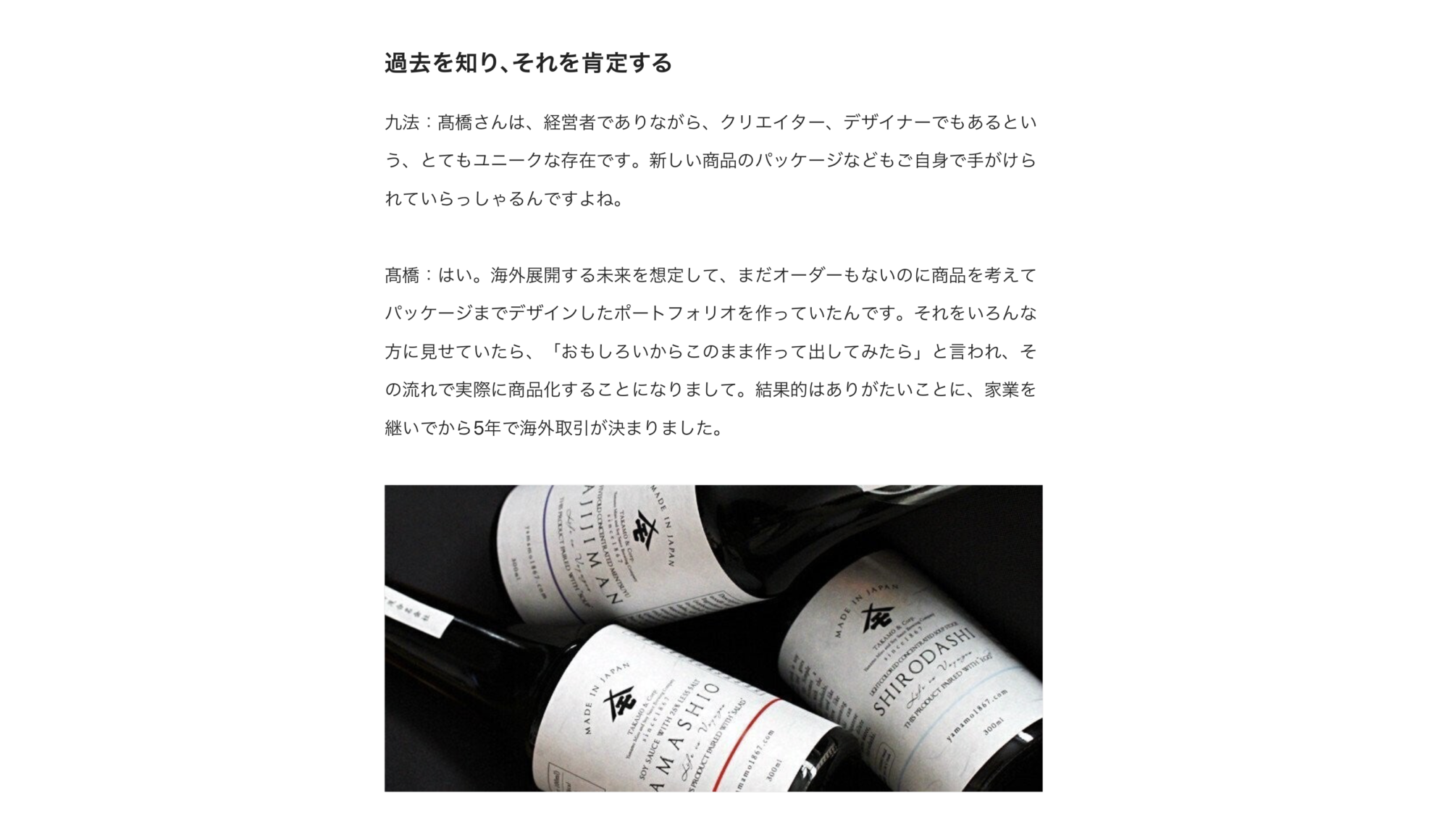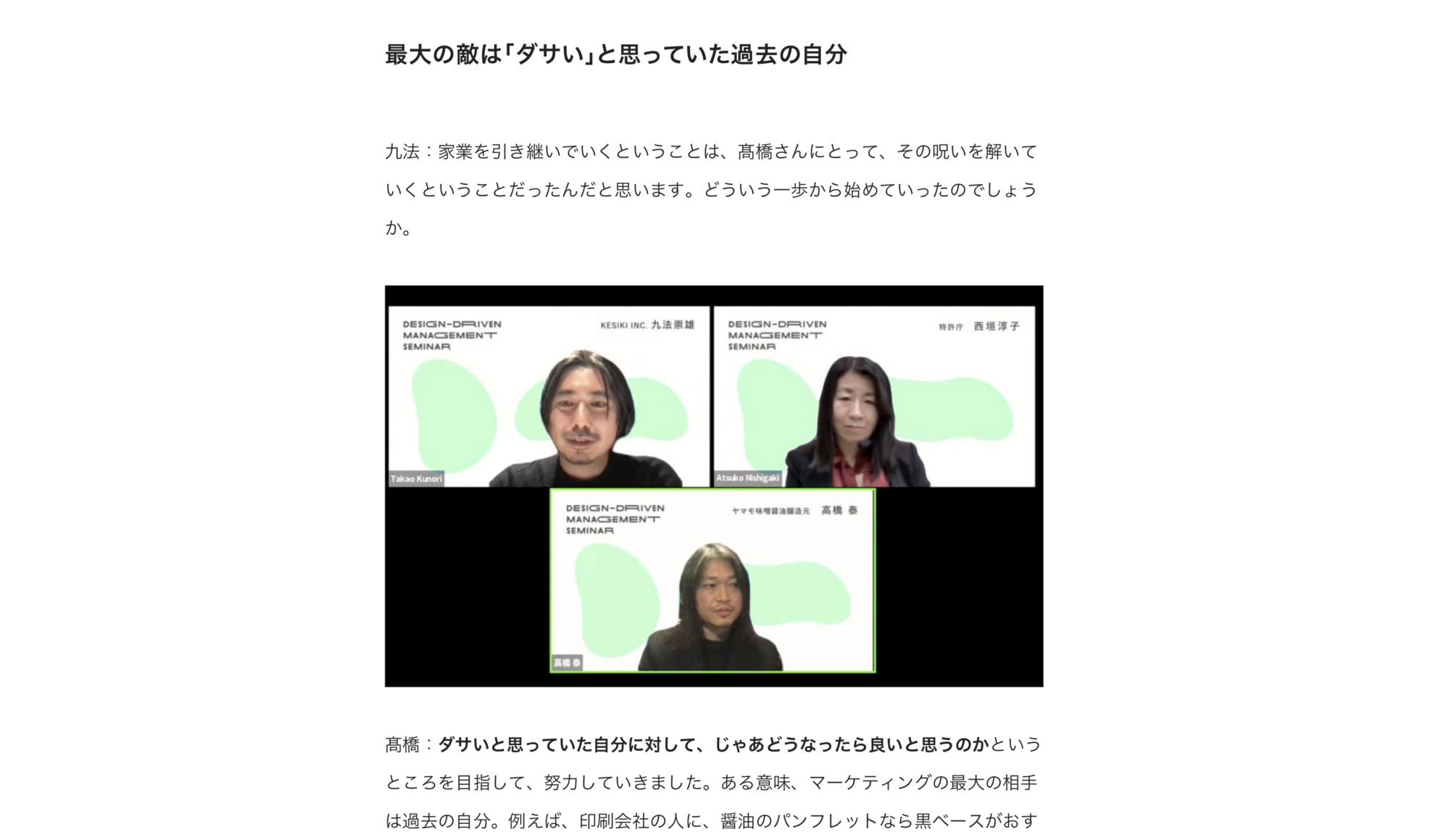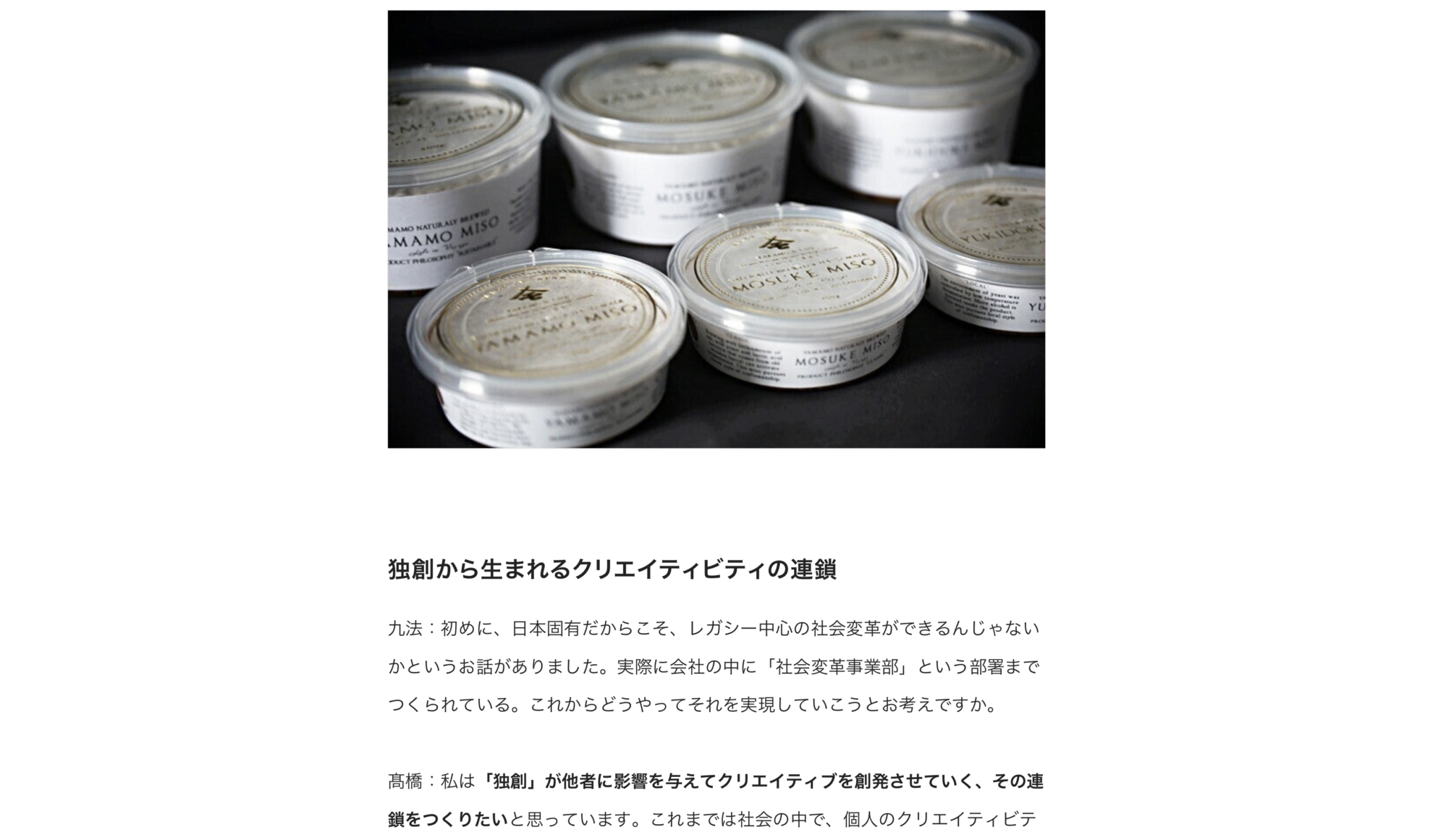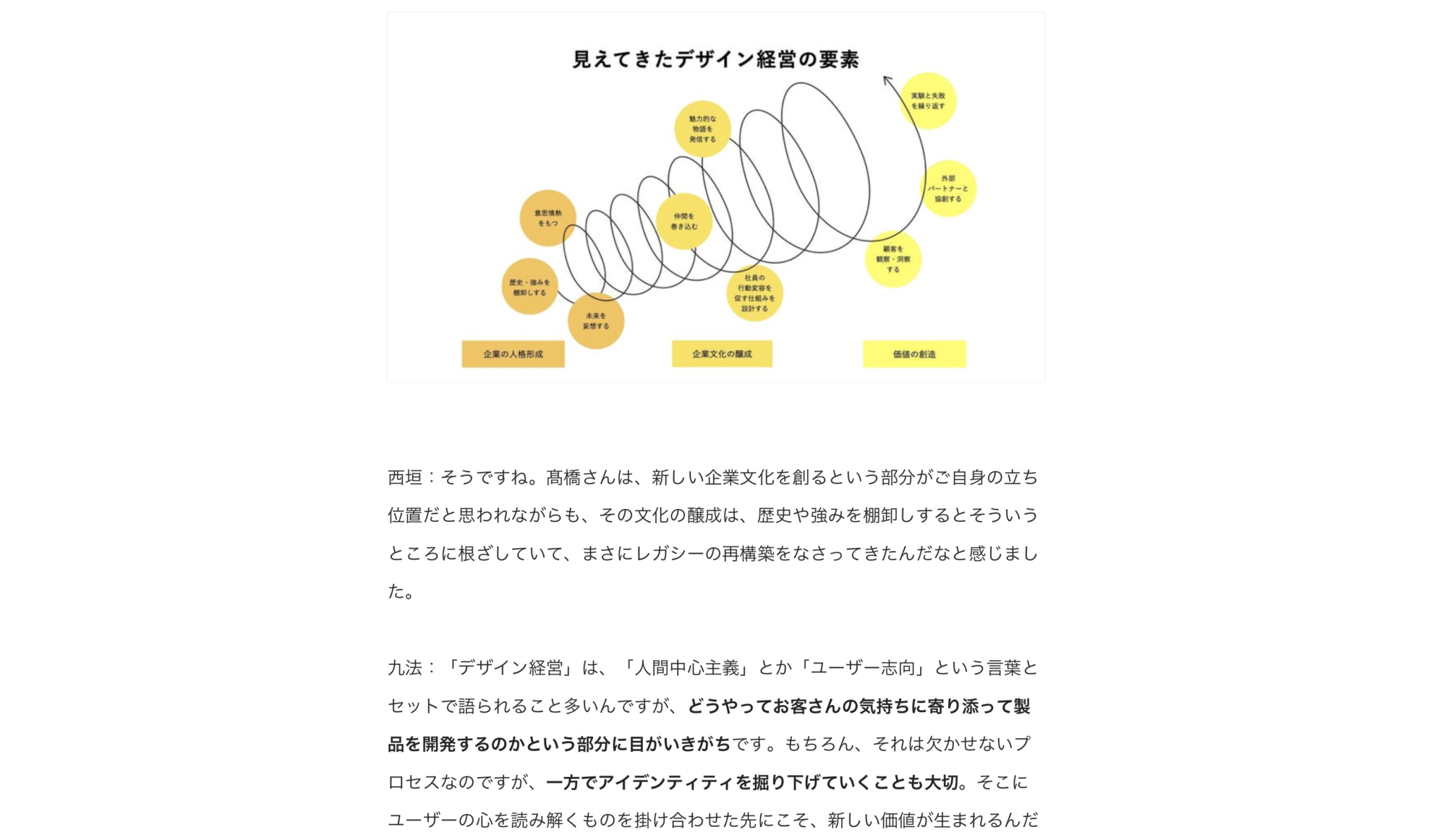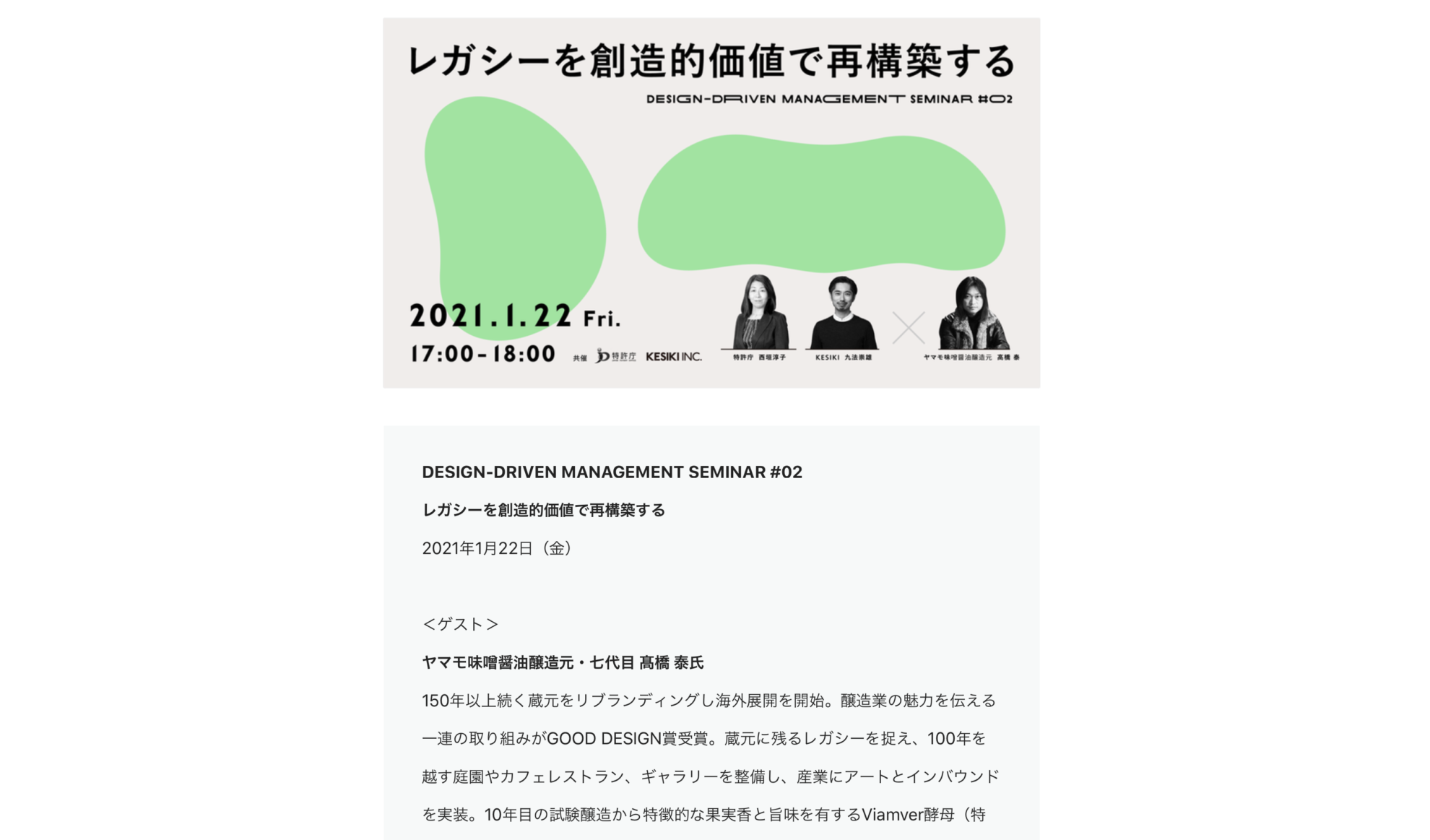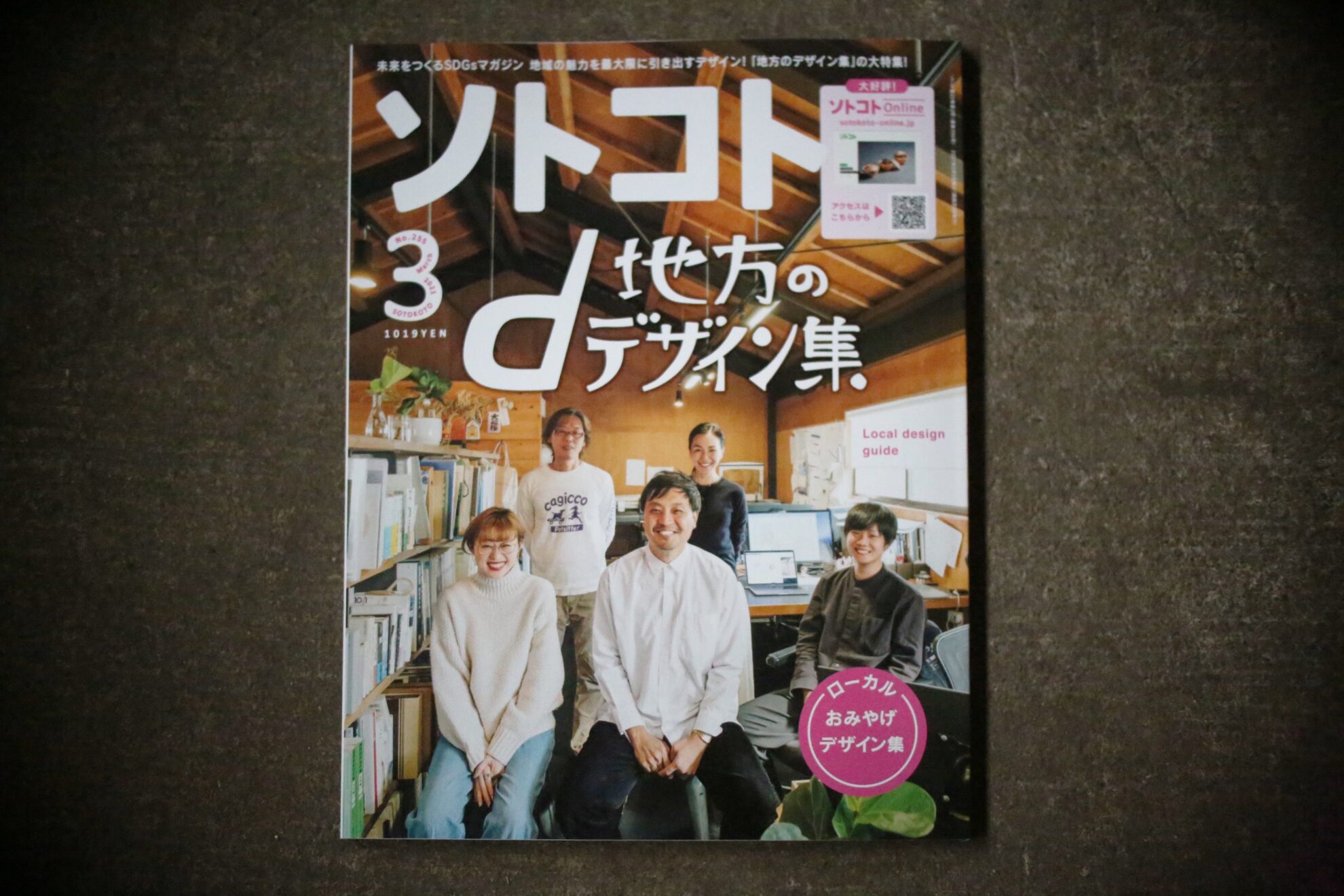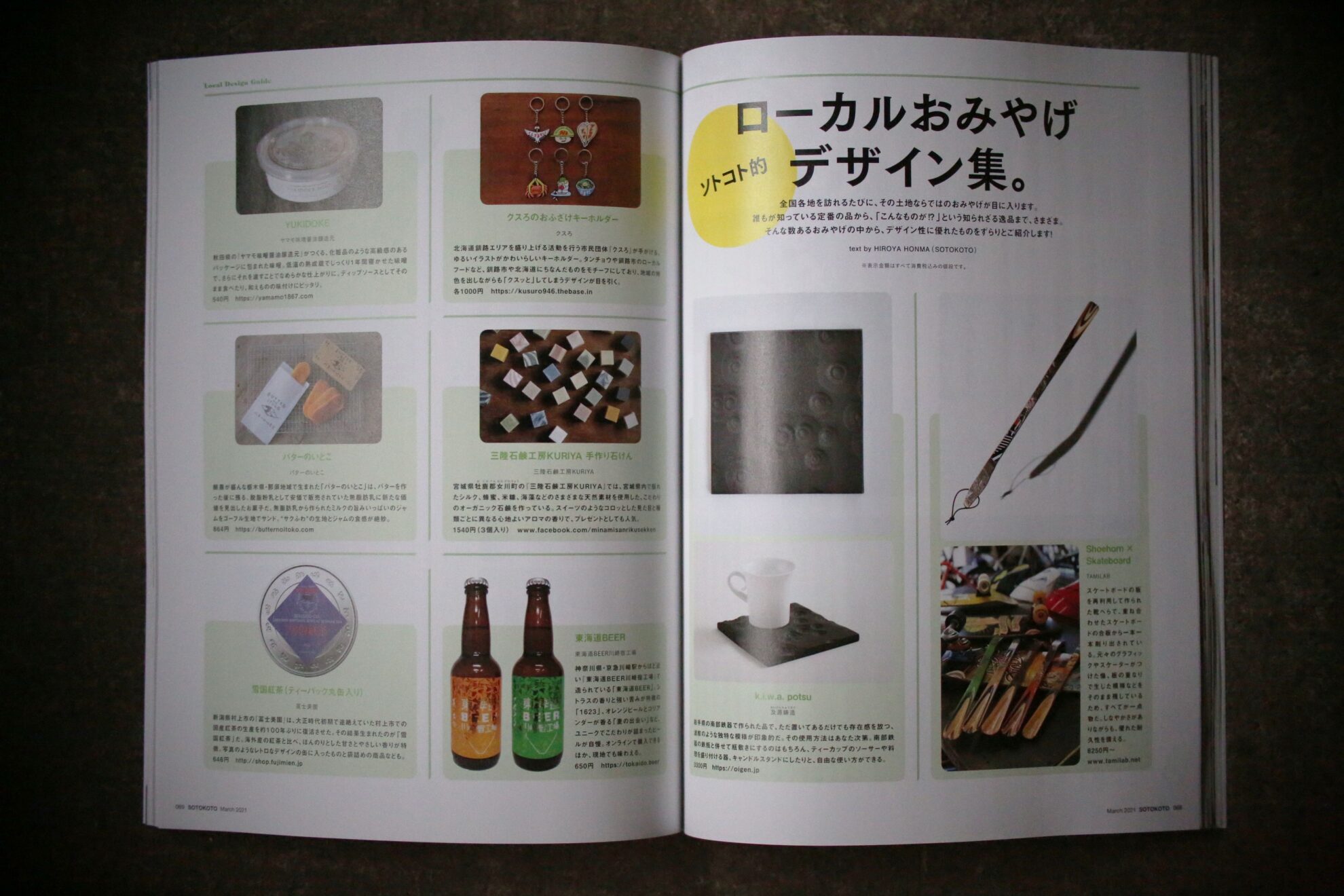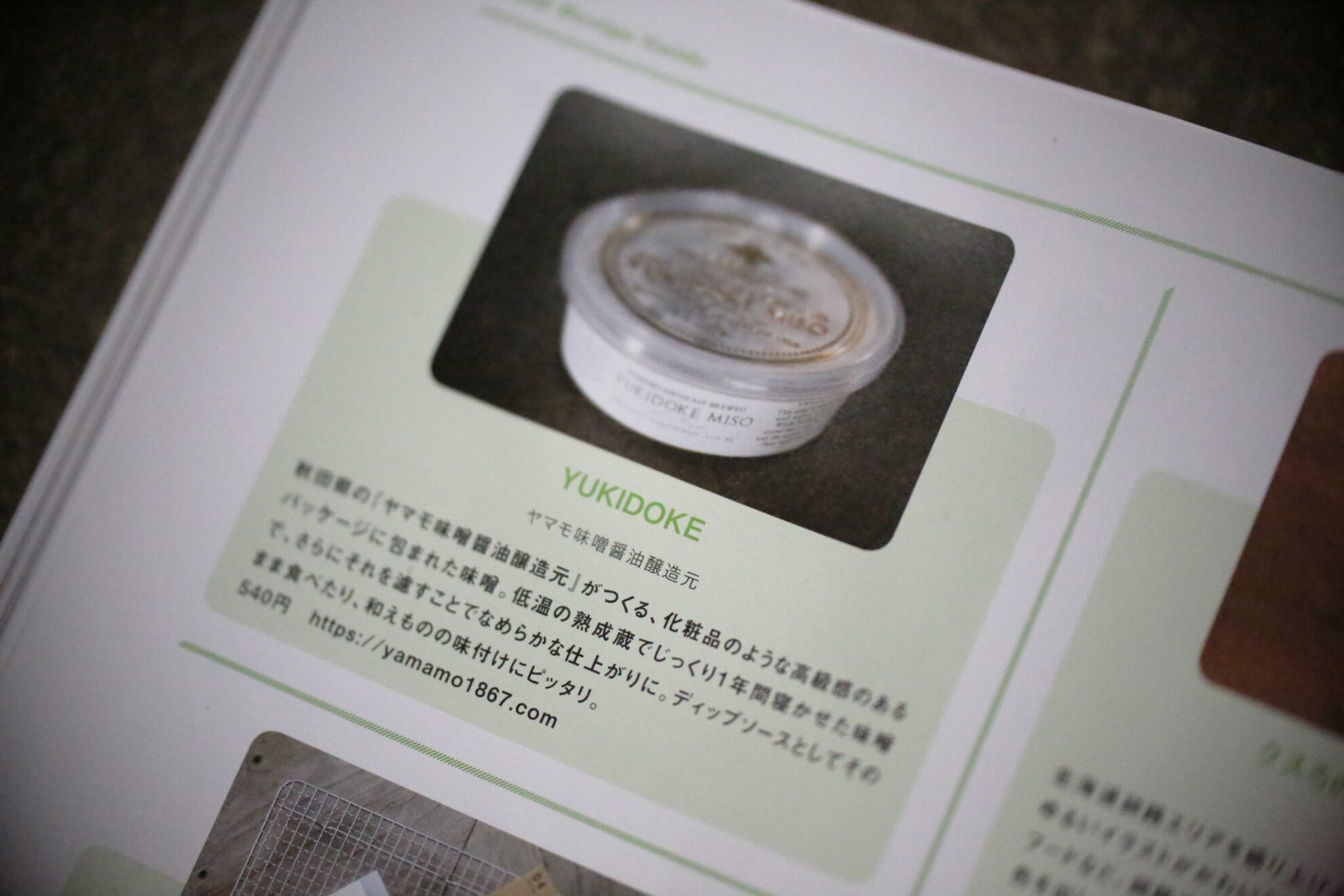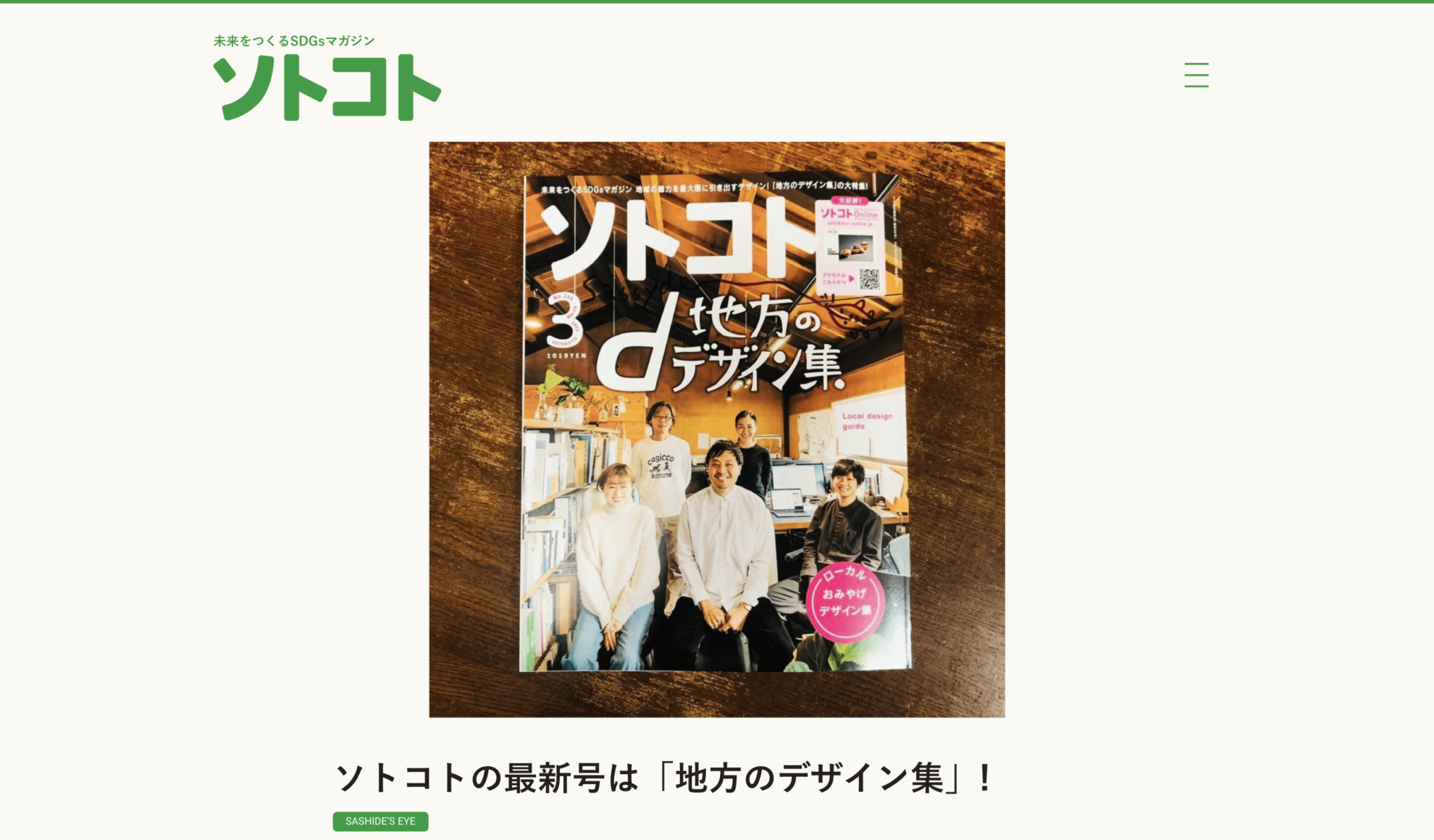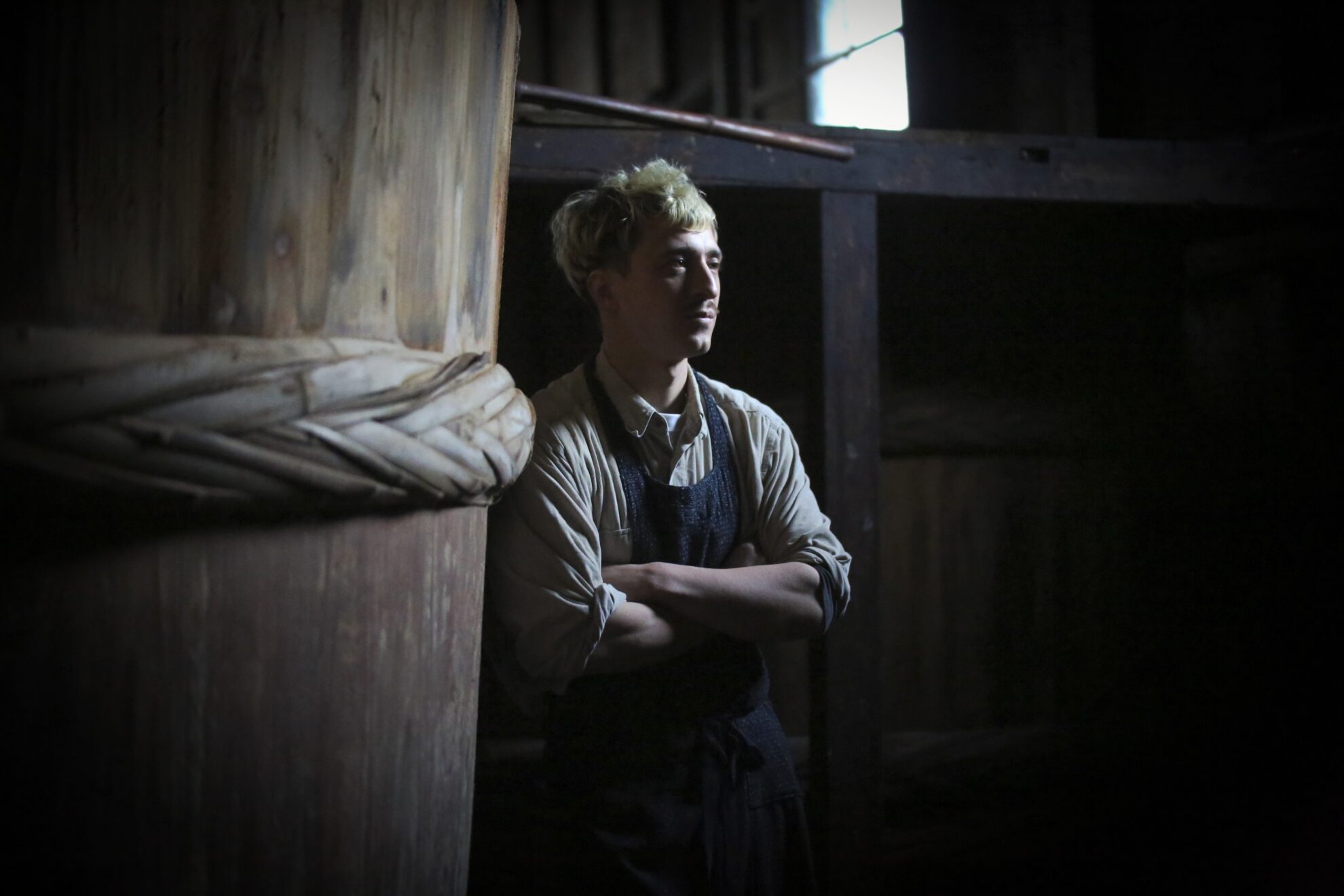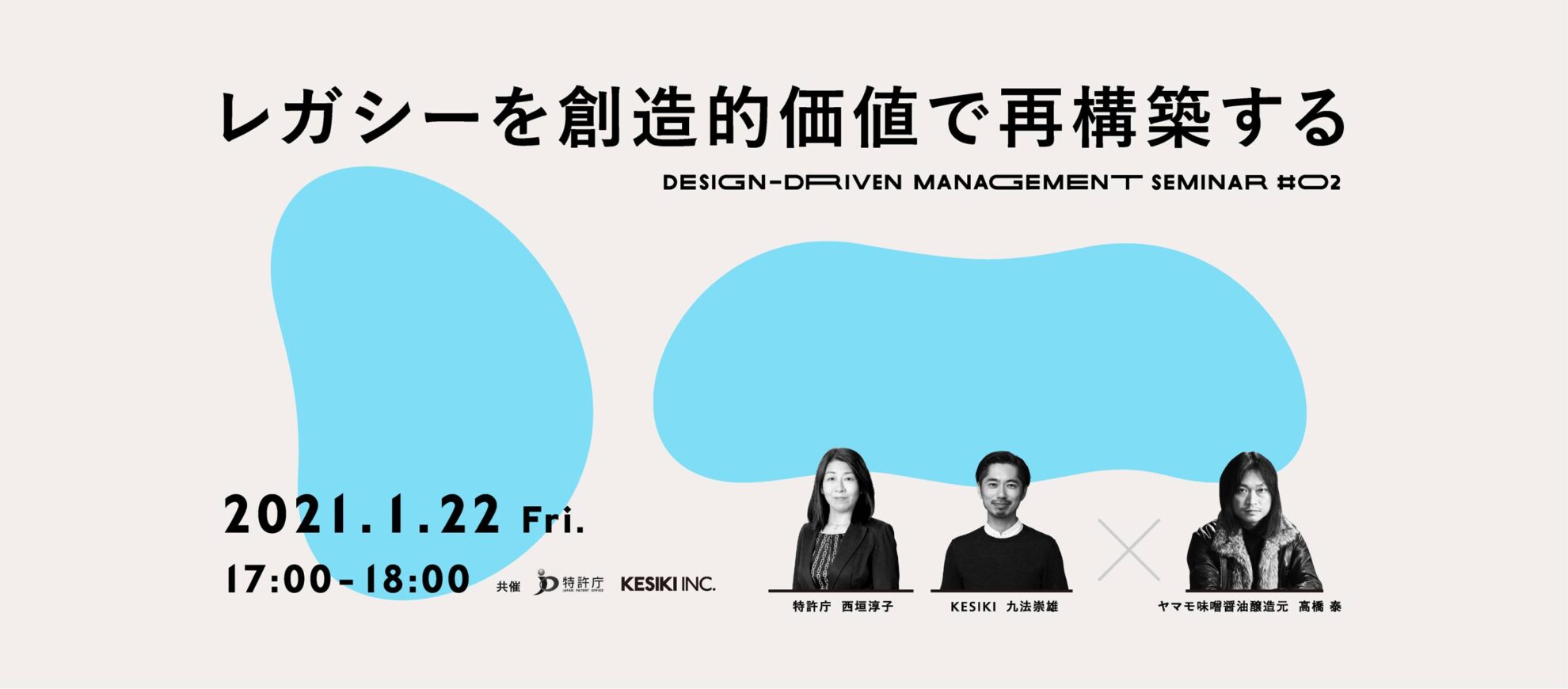海外展開を始めたころに取材していただいたWEBメディアのcolocalチームの皆さんに約8年ぶりに取材をしていただきました。なぜ改築を行い、味噌醤油だけではなく、飲食やアート活動をするのか。内外でチームを醸成し、新規性のある領域を内包していくのか。特許や学会発表など客観的エビデンスを求めるのか。多様化する弊社の活動領域をよく書いていただいていると感じました。今現在のヤマモの状況と考え方が分かります。ぜひ、ご一読いただきたいと思います。
.
Notice of Article Publication_colocal
We asked the colocal team of WEB media, who interviewed us when we started overseas expansion, to interview us for the first time in about 8 years. Why do you renovate and do not only miso soy sauce but also eating and drinking and art activities? Will we foster teams inside and outside the country and include new areas? Do you seek objective evidence such as patents and conference presentations? I felt that you often wrote about our diversifying activity areas. You can see the current situation and way of thinking of Yamamo. I would like you to read it. _mediainfo._magazine
.
文章發表通知_colocal
我們要求WEB媒體的同地團隊在我們開始海外擴張時採訪了我們,這是大約8年以來的第一次。 您為什麼要裝修,不僅味mis醬油,而且還要飲食和藝術活動? 我們是否會在國內和國外培養團隊並包括新領域? 您是否在尋找客觀證據,例如專利和會議介紹? 我覺得您經常寫關於我們多元化活動領域的文章。 您可以看到Yamamo的現狀和思維方式。 我希望你閱讀它。
.
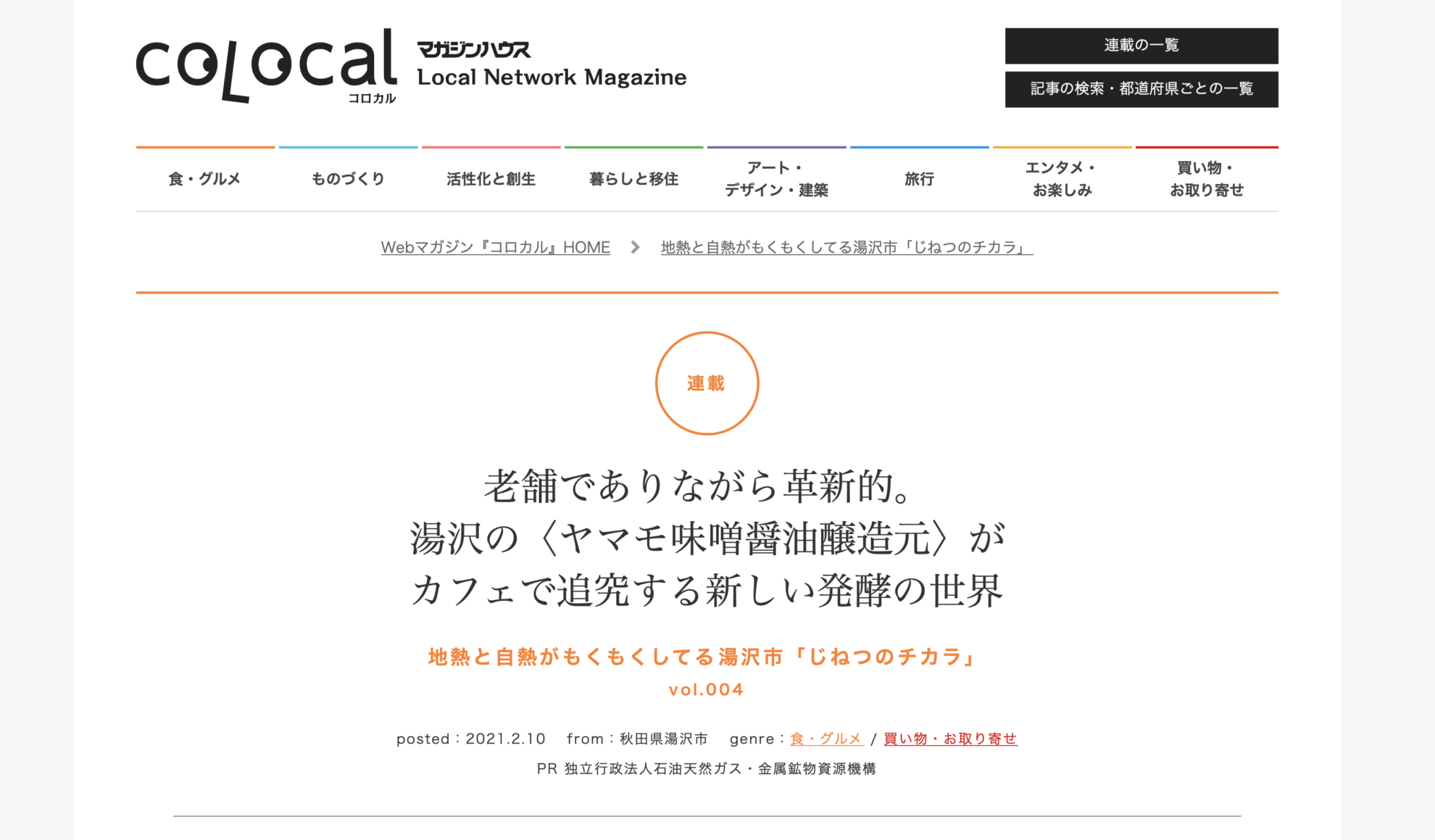
.
老舗でありながら革新的。湯沢の〈ヤマモ味噌醤油醸造元〉がカフェで追究する新しい発酵の世界
秋田県の最南に位置する湯沢市。山形県と宮城県に接し、その県境は国内でも有数の地熱地帯です。湯沢市の大地をつくりあげたマグマは、いまも「見えない火山」として活動を続け、観光や産業に生かされています。
湯沢市には、「地熱」という自然エネルギーの恩恵を受けながら、アツく、力強く、たくましく生きる「自熱」を持った地元の人々がいる――。新しいことがモクモク起きているこのまちの、新しいワクワクを紹介する連載、第4回目は、湯沢岩崎地区で慶應3(1867)年から続く〈ヤマモ味噌醤油醸造元〉の7代目、髙橋泰さんを紹介します。
.
A long-established but innovative. A new world of fermentation pursued by Yuzawa’s <Yamamo Miso and Soy Sauce Brewing Company> at a cafe
Yuzawa City is located in the southernmost part of Akita Prefecture. It borders Yamagata and Miyagi prefectures, and its prefectural border is one of the leading geothermal fields in Japan. The magma that created the land of Yuzawa City continues to operate as an “invisible volcano” and is being utilized in tourism and industry.
In Yuzawa City, there are local people who have the “self-heat” to live hot, powerful, and strong while benefiting from the natural energy of “geothermal”. The 4th serialization that introduces the new excitement of this town where new things are happening is Mr. Yasushi Takahashi, the 7th generation of <Yamamo Miso and Soy Sauce Brewing Company> that has continued since 1867 in the Yuzawa Iwasaki district. I’d like to introduce_______
.
悠久而創新的。 湯沢的<Yamamo 味噌醬油釀造商>在一家咖啡館追求的發酵新世界
湯澤市位於秋田縣的最南端。 它與山形縣和宮城縣接壤,其縣界是日本主要的地熱田之一。 創造湯澤市土地的岩漿繼續作為“看不見的火山”運行,並被用於旅遊業和工業。
在湯澤市,當地居民在受益於“地熱”自然能源的同時,擁有“自熱”的生活方式,能夠生活得熱,有力。 第四次介紹這個小鎮正在發生的新變化的連載是高橋泰先生,他是第7代<Yamamo 味噌醬油釀造商>,自1867年以來一直在湯澤岩崎地區繼續營業。
.
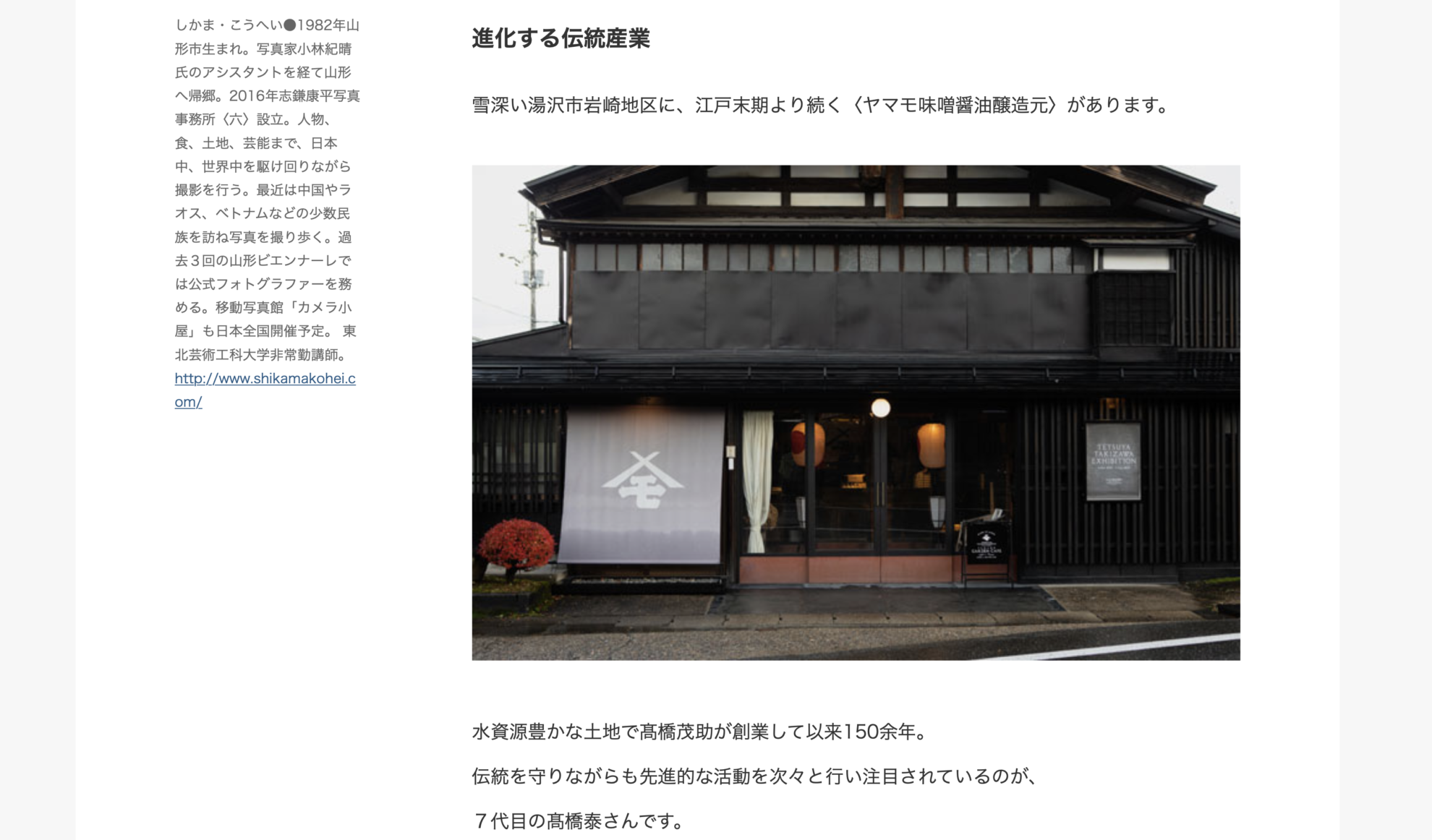
.
進化する伝統産業
雪深い湯沢市岩崎地区に、江戸末期より続く〈ヤマモ味噌醤油醸造元〉があります。水資源豊かな土地で髙橋茂助が創業して以来150余年。伝統を守りながらも先進的な活動を次々と行い注目されているのが、7代目の髙橋泰さんです。「お客様は変わらない味を求めますが、変わらないと産業は終わってしまう。進化しなくてはいけない」と新たな発酵の世界を追求しています。
関東の大学に進学し、2007年に家業を継いだ7代目の髙橋泰さん。従来の商品に加え、新しいパッケージのデザインを自ら手がけるなど、少しずつ自分のビジョンをかたちにしてきました。以前コロカルで取材した記事はこちら。
地元で愛され続ける定番商品をつくりながら、「世界の食文化と和の調味料が融合し、進化していくこと」を理念に、2012年より味噌醤油製品の海外輸出を開始。最初は蔵の軒先に小さなショップをつくり、やがて回遊式庭園を整備、〈YAMAMO GARDEN CAFE〉とアートギャラリーをつくり、地域の活性化にもつながるインバウンドツアーも行うようになりました。
蔵に併設する〈YAMAMO GARDEN CAFE〉。蔵元が存続した背景やその世界観を伝えたいという思いからリノベーションし、自社の味噌醤油を使用したジェラートの提供から営業がスタートしました。
泰さんがリスペクトする、町長も務めた本家髙橋七之助や、4代目にまつわる作品を展示するギャラリー。アート作品として時代を超え100年前のメッセージを伝えること、地域の人に美意識をもってもらうことも伝統産業の役割と考えています。
.
Evolving traditional industry
In the snowy Iwasaki district of Yuzawa City, there is <Yamamo Miso Soy Sauce Brewer> that has continued since the late Edo period. It has been more than 150 years since Mosuke Takahashi was founded in a land rich in water resources.
Mr. Yasushi Takahashi, the 7th generation, is attracting attention as he continues to carry out advanced activities while preserving tradition. “Customers want the same taste, but if it doesn’t change, the industry will end. We have to evolve,” he says, pursuing a new world of fermentation.
Mr. Yasushi Takahashi, the 7th generation who entered a university in Kanto and took over the family business in 2007. In addition to his traditional products, he has gradually shaped his vision, such as designing new packages himself. Click here for the article I covered in Corocal before.
In 2012, we started exporting miso soy sauce products overseas, with the philosophy of “Fusing and evolving the world’s food culture and Japanese seasonings,” while creating standard products that continue to be loved by the locals. At first, a small shop was built at the eaves of the warehouse, and then a strolling garden was built, an art gallery was built with <YAMAMO GARDEN CAFE>, and inbound tours that led to regional revitalization began.
<YAMAMO GARDEN CAFE> attached to the warehouse. We renovated from the desire to convey the background of the brewery’s survival and its world view, and started business by providing gelato using our own miso soy sauce.
A gallery that displays works related to the 4th generation and the head family, Shichinosuke Takahashi, who also served as the mayor, which Mr. Yasushi respects. We believe that the role of traditional industries is to convey the message of 100 years ago as an art work and to give local people a sense of beauty.
.
不斷發展的傳統產業
在湯澤市白雪皚皚的岩崎地區,有“Yamamo味噌醬油釀造商”自江戶時代後期以來一直在持續。高橋茂助在水資源豐富的土地上成立至今,已有150多年的歷史。第7代高橋泰先生在繼續進行高級活動的同時保持傳統的同時,也引起了人們的注意。我們追求的是發酵的新世界,他說:“客戶想要相同的口味,但如果不改變,行業將終結。我們必鬚髮展。”
第7代高橋泰先生進入關東大學學習,並於2007年接管家族企業。除了常規產品外,我一直在逐步塑造自己的願景,例如自己設計新包裝。單擊此處以獲取我之前在Corocal中涉及的文章。
2012年,我們以“融合和發展世界的飲食文化和日本調味料”為理念,開始向世界各地出口味噌醬油產品,同時創造出深受當地人喜愛的標準產品。最初,在倉庫的屋簷下建了一個小商店,然後建了一個漫步花園,並用<YAMAMO GARDEN CAFE>建造了一個美術館,並開始了導致區域復興的入境旅遊。
<YAMAMO GARDEN CAFE>連接到倉庫。我們從傳達啤酒廠生存背景及其世界觀的願望進行了革新,並通過使用我們自己的味噌醬油提供意式冰淇淋來開展業務。
一家展示了與第四代人和首領家族相關的作品的畫廊,高橋七之助也曾擔任過市長,靖三先生對此表示敬意。我們認為,傳統工業的作用是傳達100年前作為藝術品的信息,並給當地人以美感。
.
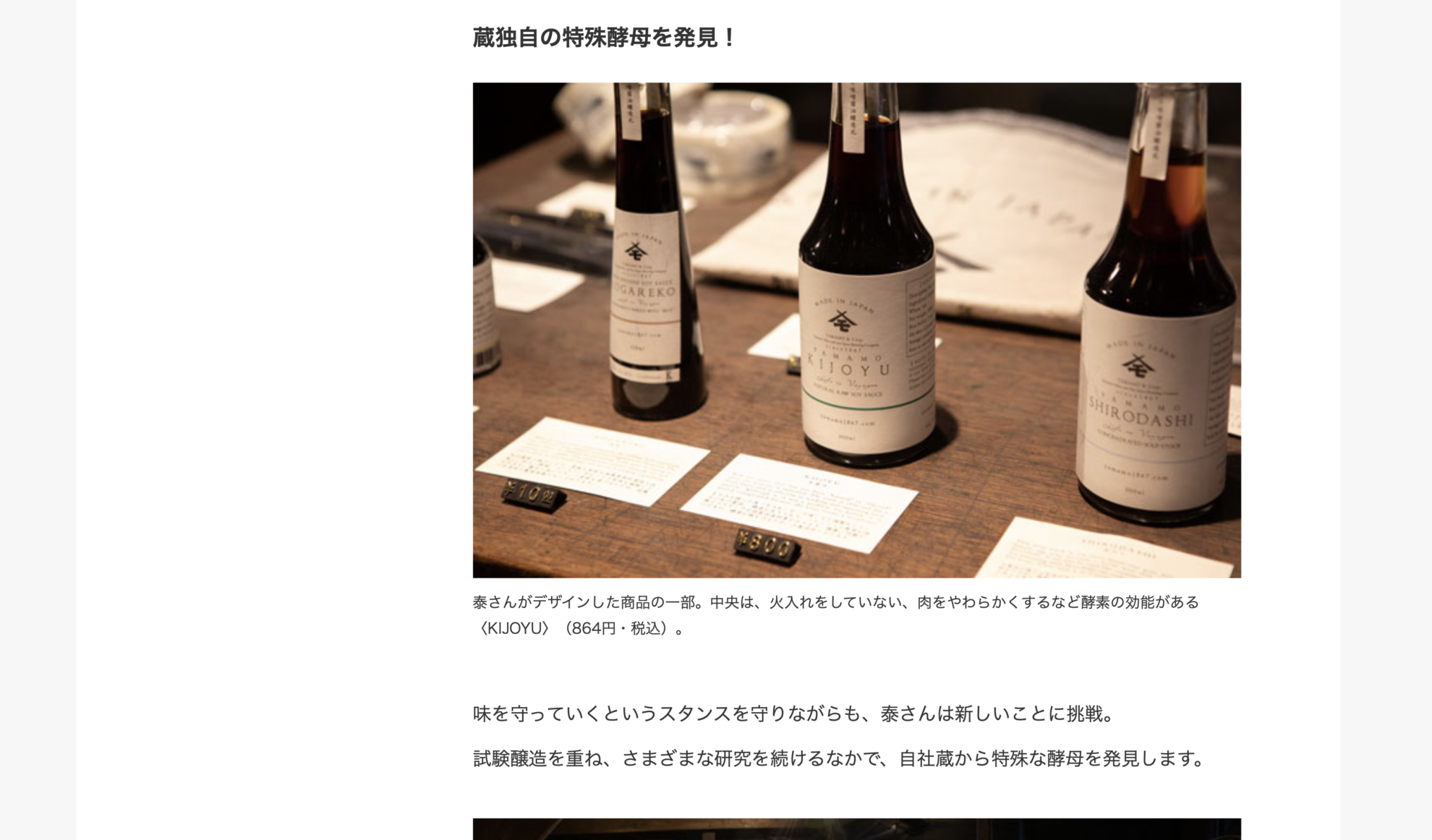
.
特殊酵母を発見!
泰さんがデザインした商品の一部。地元で長く愛されているのは醤油〈AMASIO〉。火入れをしていない、肉をやわらかくするなど酵素の効能があるのは中央の〈KIJOYU〉。
味を守っていくというスタンスを守りながらも、泰さんは新しいことに挑戦。試験醸造を重ね、さまざまな研究を続けるなかで、自社蔵から特殊な酵母を発見します。
酵母を培養する実験室「cultivator」は、カフェと蔵をつなぐスペースにあり、ガラス越しに見学可能です。
発見した酵母は、味噌醤油の仕込みのみならず、肉や魚の肉質改善や、ワインの醸造もできる特性を持ったもの。さまざまな料理に応用できる菌を発見する確率は新しい惑星を見つけるのに等しいほどの天文学的な数字であること、発見した菌が魚介系の旨みをつくるコハク酸を持つことから、惑星と鉱物(琥珀:amber)の名前を掛け合わせ〈Viamver(ヴィアンヴァー)〉と命名しました。
「お酒の酵母は塩分があると死滅するため料理に使うことができないですし、反対に塩分を好む酵母を塩分のない状態にしてしまうと死滅してしまいます。ヴィアンヴァーは塩分があってもなくても働くので、お酒も料理もつくることができる、ほかに類を見ない酵母なんです」
.
Discover special yeast!
Some of the products designed by Mr. Yasushi. Soy sauce <AMASIO> has been loved locally for a long time. The central <KIJOYU> has the effect of enzymes such as not burning and softening the meat.
While maintaining the stance of preserving the taste, Mr. Yasushi challenges new things. Through repeated trial brewing and continuing various researches, we discover a special yeast from our own brewery.
The yeast cultivator “cultivator” is located in the space connecting the cafe and the warehouse, and can be visited through the glass.
The yeast found has the property of not only preparing miso soy sauce, but also improving the quality of meat and fish and brewing wine. The probability of discovering a fungus that can be applied to various dishes is an astronomical number equivalent to finding a new planet, and because the found fungus has succinic acid that creates the taste of seafood, planets and minerals ( Amber: amber) was multiplied and named <Viamver>.
“The yeast in liquor can’t be used in cooking because it dies when it has salt, and on the contrary, it dies when yeast that likes salt is made salt-free. Vianver has salt. It works without it, so you can make sake and food, and it’s a yeast like no other. “
.
發現特殊的酵母!
泰先生設計的某些產品。醬油<AMASIO>在當地很受喜愛。中央的<KIJOYU>具有酶的作用,例如不會燃燒和軟化肉。
泰先生在保持口味保留立場的同時,對新事物提出了挑戰。通過反复嘗試釀造和繼續進行各種研究,我們從自己的啤酒廠中發現了一種特殊的酵母。
酵母培養機“培養機”位於連接咖啡館和倉庫的空間中,可以通過玻璃杯進行訪問。
發現的酵母不僅具有製備味preparing醬油的特性,而且還可以改善肉,魚和釀造葡萄酒的質量。發現可以應用於各種菜餚的真菌的概率是一個天文數字,等於發現一個新的星球,並且由於發現的真菌具有琥珀酸,從而產生了海鮮,行星和礦物質的味道(琥珀色:琥珀色),並且名為<Viamver>。
“酒中的酵母不能用於烹飪,因為它含鹽時會死亡,相反,當喜歡鹽的酵母不含鹽時會死亡。Vianver含鹽。沒有它,它可以起作用,因此您可以做清酒和食物,這是其他任何酵母。”
.
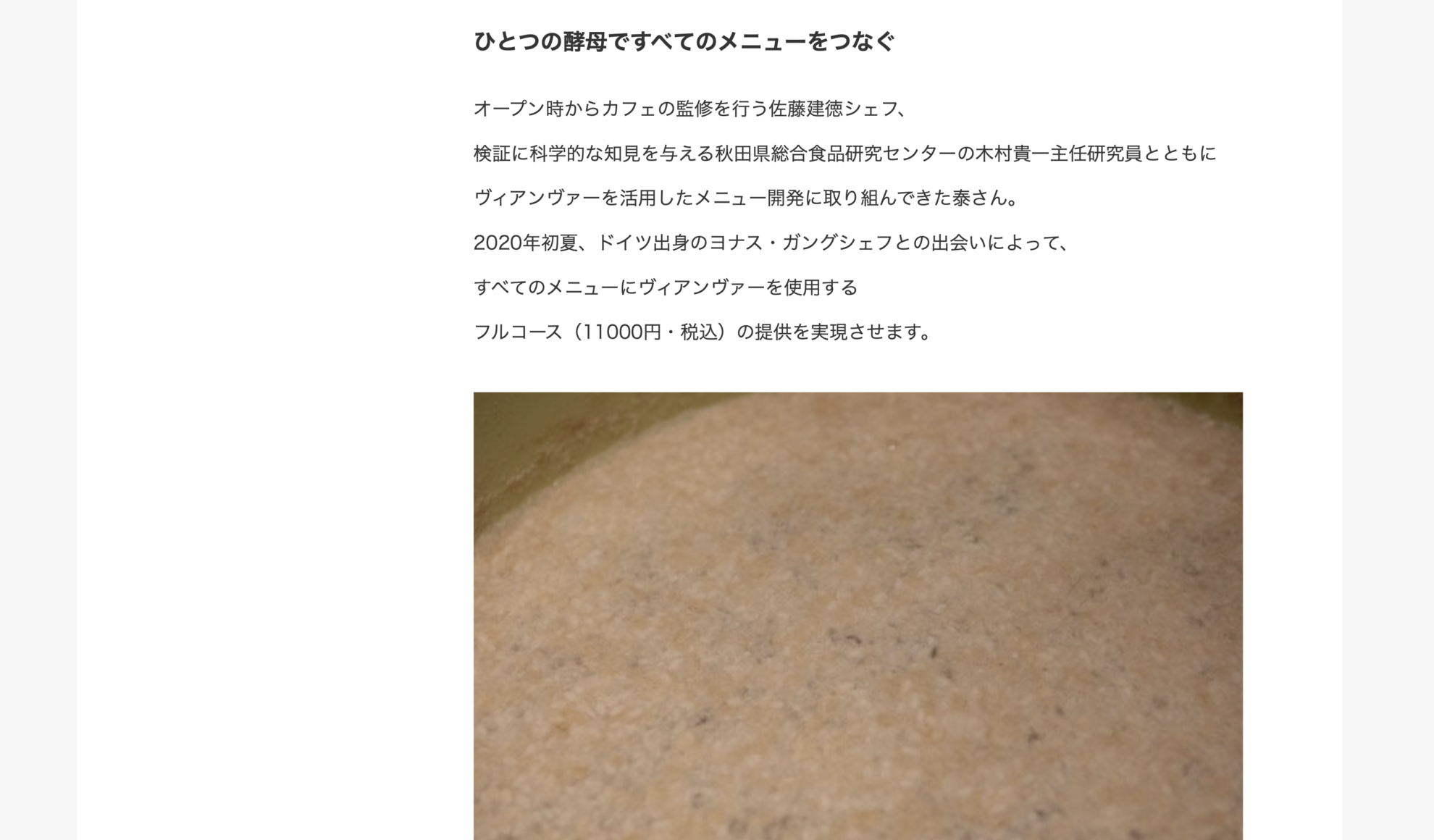
.
ひとつの酵母ですべてのメニューをつなぐ
オープン時からカフェの監修を行う佐藤建徳シェフ、検証に科学的な知見を与える秋田県総合食品研究センターの木村貴一主任研究員とともにヴィアンヴァーを活用したメニュー開発に取り組んでいた泰さん。2020年初夏、ドイツ出身のヨナス・カングシェフとの出会いによって、すべてのメニューにヴィアンヴァーを使用するフルコースの提供を実現させます。
ナチュラルワインのような酵母の香りと塩味、魚介系の旨みを感じる〈ヴィアンヴァー〉の酵母発酵液。その特質から日本醸造学会で発表、特許微生物とし、その発酵物を製法特許で出願しました。
「すごく偶然だし、幸運なことだと思っています。コロナがなければ出会えなかったし、日本に秋田があることさえ知らなかった。(泰さんが)菌に注目しているのはとてもおもしろい。アイデアを思いついたら新鮮な素材ですぐに実験ができる環境も、とても恵まれていると思います」
ケルン出身で材料工学を学んだのちシェフに転身したヨナスシェフ。発酵を用いた独創的な料理で知られるコペンハーゲンの〈noma〉のDNAを引き継ぐ〈INUA〉(東京)で働くため来日しましたが、新型コロナウイルス感染症対策のため店が長期休業に。スキルアップできる場所を探していたところ、知人を介し泰さんのもとへたどり着きます。
発酵の知識を持ち、ヴェジタリアン向けのコースを提供していた経験もあるヨナスシェフが常駐できる態勢が整ったことで、カフェでのフルコースの提供が現実となります。
コースのアンティパスト・季節の野菜のサラダ。散りばめられるのはヴィアンヴァーの酵母発酵液で調理したニンジンやサツマイモ、醤油でローストしたナッツなど。地のキノコのソテーに酵母発酵させたキノコのソース・ヨーグルトのドレッシングが添えられます。
「発酵食品のみを使ったコースはあると思いますが、ひとつの酵母だけで構成するコースは世界でもほかにはないと思います」と、新しい領域への挑戦を楽しむ泰さん。
ヴィアンヴァーで発酵させたパンも開発。味噌醤油由来の酵母は発生するガスが少ないため、栄養源としてぶどう果汁を加えたり寝かせる時間を長くするなど、菌が働く環境を整える実験を繰り返し、完成させました。
酵母を発酵させ、味噌で味を調えたバターと一緒にいただきます。
.
Connect all menus with one yeast
Chef Tatsunori Sato, who has supervised the cafe since its opening, and Kiichi Kimura, a senior researcher at the Akita Research Institute for Food Research, who gives scientific knowledge to verification, have been working on menu development using Viamver. In the early summer of 2020, we met German-born Chef Jonas Kang to offer a full-course meal with Viamba on all menus.
<Vianver> yeast fermented liquid with the aroma and saltiness of yeast like natural wine and the taste of seafood. Due to its characteristics, it was presented at the Brewing Society of Japan, made into a patented microorganism, and the fermented product was applied for with a manufacturing method patent.
“It’s a coincidence and I’m lucky. I couldn’t meet without Corona, and I didn’t even know that there was Akita in Japan. It’s very interesting that (Yasushi-san) is paying attention to the fungus. I think we are very fortunate to have an environment where you can immediately experiment with fresh materials when you come up with an idea. ”
Chef Jonas, who was born in Cologne and studied materials engineering before becoming a chef. I came to Japan to work in <INUA> (Tokyo), which inherits the DNA of <noma> in Copenhagen, which is known for its original cooking using fermentation, but the store is closed for a long time to prevent new coronavirus infections. When she was looking for a place to improve her skills, she arrived at Mr. Yasushi through an acquaintance.
Now that Jonas Chef, who has knowledge of fermentation and has experience in providing courses for vegetarians, is ready to stay, the full course at the cafe will become a reality.
Course antipasto / seasonal vegetable salad. Sprinkled with carrots and sweet potatoes cooked in Viamver’s yeast fermented liquid, nuts roasted in soy sauce, etc. Sautéed local mushrooms are served with yeast-fermented mushroom sauce and yogurt dressing.
“I think there are courses that use only fermented foods, but I don’t think there is any other course in the world that consists of only one yeast,” says Yasushi, who enjoys taking on the challenge of new fields.
He also developed bread fermented with Viamver. Since yeast derived from miso soy sauce produces less gas, we repeated experiments to prepare the environment in which the bacteria work, such as adding grape juice as a nutrient source and lengthening the time to let it rest, and completed it.
.
.
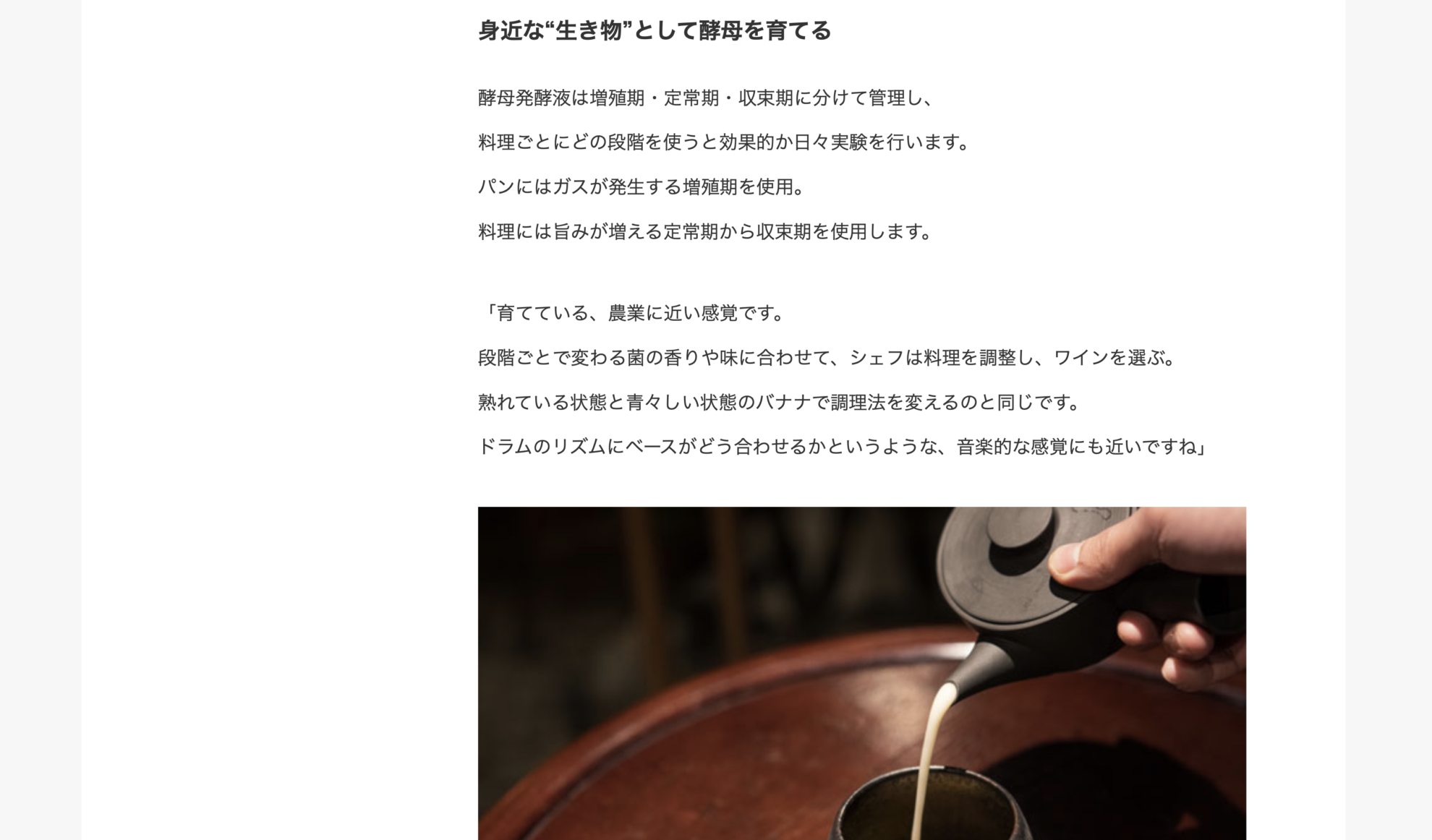
.
身近な生き物として酵母を育てる
酵母発酵液は増殖期・定常期・収束期に分けて管理し、料理ごとにどの段階を使うと効果的か日々実験を行います。パンにはガスが発生する増殖期を使用。料理には旨みが増える定常期から収束期を使用します。
「育てている、農業に近い感覚です。段階ごとで変わる菌の香りや味に合わせて、シェフは料理を調整し、ワインを選ぶ。熟れている状態と青々しい状態のバナナで調理法を変えるのと同じです。ドラムのリズムにベースどう合わせるかというような、音楽的な感覚にも近いですね」
注いでいるのはお茶ではなく、3種のネギのヴィシソワーズ。こんな提供の仕方にもワクワク感が。
クリーム系と合わせるとチーズのような風味をつくる酵母の特徴を感じさせる一品。具材は発酵熟成させたサーモン。
酵母で濃厚さを倍増させたカボチャとブリーチーズのリゾット。発酵で梅干しのように酸が強くなったトマトをアクセントに。「強烈な味のものを混ぜるとバランスよく食べられるんです」
代表的なフルコースとは反対に、メインを肉、魚の順に提供するのも、魚介の旨みを持つ酵母の特徴を最大に生かすため。旨みがどんどん蓄積され、幸せが伸びていくイメージで料理が重ねられています。
肉のメインは発酵熟成させた秋田県産豚。噛みきれないかたさの肩肉が、酵母の力でナイフでほぐせるほどやわらかくなっています。コラーゲンも旨みに変わり、酵母発酵液の自然な塩味が引き立つひと皿。酵母液を添加した紫芋のピューレと洋梨のバターソテーと一緒に。
魚のメインは発酵熟成させた真鱈。酵母発酵液でつくるマヨネーズのような調味料と香草パン粉をのせてオーブンで焼き上げました。エビの殻を長時間炒めたソースに味噌がアクセントで入ります。多層的な味をすっきりと流してくれるオレンジワインをペアリング。
「僕は無理やり素材をとりにいくのが嫌いなので、そのとき手に入るもので料理しています」と話すのは佐藤シェフ。自ら船を出し網も引くなど、「自分でわかる素材しか使わない」と、生産者とつながり現場を訪れることを大切にしています。
佐藤シェフは日本海に面した港町・秋田県にかほ市(旧金浦町)出身。店舗を持たず、さまざまなレストランの料理やサーヴィスの監修を行っています。
「味噌醤油屋さんのレシピなんですが、味噌醤油をほとんど使っていないんです(笑)。使ったら楽なんですけど、そうしてしまうとどこもできるレシピになってしまうので」
泰さんも「味噌醤油を使わないでとは一度も言っていないんすが(笑)、自分はなるべく“飛躍したい”と思っていて、佐藤シェフはその思いを汲み取って素材を選んでくれるのでありがたいです」
お互い信頼し合い、楽しんでいる。いいチームができていることが伝わってきます。
.
Grow yeast as a familiar creature
The yeast fermented liquor is managed separately in the growth phase, steady phase, and convergence phase, and daily experiments are conducted to determine which stage is effective for each dish. Bread uses a growth period in which gas is generated. For cooking, use the stationary period to the convergent period when the taste increases.
“It’s like growing and farming. The chef adjusts the food and chooses wine according to the aroma and taste of the fungus that changes from stage to stage. Change the cooking method with bananas in ripe and lush states. It’s the same as. It’s close to a musical feeling, like how to match the bass to the rhythm of the drum. “
It is not tea that is being poured, but three kinds of green onions, Vichyssoise. I’m excited about how to provide this.
A dish that makes you feel the characteristics of yeast that creates a cheese-like flavor when combined with cream. The ingredients are fermented and aged salmon.
Pumpkin and brie risotto with yeast doubled in thickness. Accented with tomatoes that have become more acidic like dried plums due to fermentation. “If you mix something with a strong taste, you can eat it in a well-balanced manner.”
Contrary to the typical full-course meal, the main dishes are served in the order of meat and fish in order to maximize the characteristics of yeast, which has the umami of seafood. The dishes are piled up with the image that the taste is accumulated and happiness grows.
The main meat is fermented and aged pork from Akita prefecture. The hard shoulder meat that cannot be chewed is soft enough to be loosened with a knife by the power of yeast. Collagen also turns into umami, and a dish that brings out the natural salty taste of yeast fermented liquid. With purple potato puree and pear butter saute with yeast solution.
The main fish is fermented and aged Pacific cod. It was baked in the oven with a mayonnaise-like seasoning made from yeast fermented liquid and herb bread crumbs. Miso is accented with a sauce made by stir-frying shrimp shells for a long time. Pairing orange wine that gives a refreshing multi-layered taste.
“I don’t like to force myself to pick up ingredients, so I cook with what I can get at that time,” says Chef Sato. He cherishes connecting with producers and visiting the site, saying, “I only use materials that I can understand,” such as by setting up a ship and pulling a net.
Chef Sato is from Nikaho City (formerly Konoura Town) in Akita Prefecture, a port town facing the Sea of Japan. He does not have a store and supervises the food and services of various restaurants.
“It’s a recipe from a miso soy sauce shop, but I rarely use miso soy sauce (laughs). It’s easy to use, but if you do that, it will be a recipe that you can do anywhere.”
Mr. Yasushi “I have never said that I should not use miso soy sauce (laughs), but I want to make a leap forward as much as possible, and I am grateful that Chef Sato takes that thought into consideration when choosing the ingredients. “
We trust each other and enjoy ourselves. You can see that a good team is formed.
.
成長酵母作為熟悉的生物
酵母發酵液在生長階段,穩定階段和收斂階段分別進行管理,並且每天進行實驗以確定哪個階段對每道菜都有效。麵包在生長期中會產生氣體。對於烹飪,當味道增加時,請使用靜止期至收斂期。
“就像種田和種田一樣。廚師根據真菌的香氣和口味來調整食物並選擇葡萄酒,而香氣和口味會隨著階段的變化而變化。在成熟和郁鬱蔥蔥的狀態下,用香蕉來改變烹飪方法。這是一樣的。很接近具有音樂上的感覺,例如如何使低音與鼓的節奏相匹配。”
不是倒茶,而是三種大蔥,Vichyssoise。我很高興如何提供此服務。
一盤讓您感覺到酵母特性的菜,與奶油混合後會產生類似奶酪的味道。成分是發酵鮭魚和陳年鮭魚。
帶有酵母的南瓜和法國干酪燴飯的厚度增加了一倍。帶有西紅柿的酸味,由於發酵而變得像李子乾一樣酸。 “如果您將口味濃郁的東西混合在一起,就可以均衡地食用它。”
與典型的全餐餐相反,主菜按肉和魚的順序提供,以最大程度地發揮酵母的特徵,酵母具有海鮮的鮮味。盤子上堆滿了味道累積和幸福成長的印象。
主要的肉是秋田縣產的發酵豬肉和陳年豬肉。不能咀嚼的堅硬肩肉足夠柔軟,可以被酵母的力量用刀鬆開。將膠原蛋白變成鮮味並帶出酵母發酵液天然鹹味的菜。用紫色土豆泥和梨黃油用酵母溶液炒香。
主要魚類是發酵的和老化的太平洋鱈魚。它在烤箱中烤製,具有蛋黃醬狀的調味料,該調味料由酵母發酵液和香草麵包屑製成。味噌上加了長時間油炸蝦殼製成的醬汁。搭配橙酒,可帶來令人耳目一新的多層風味。
佐藤廚師長說:“我不喜歡強迫自己去挑選食材,所以我會用當時能拿到的東西做飯。”重要的是要與生產者聯繫並訪問該站點,並說“我們只使用我們能理解的材料”,例如設置一條船並拉網。
佐藤大廚來自秋田縣的Nikaho市(原名金浦町鎮),這是一個面向日本海的港口小鎮。我們沒有商店,並監督各種餐廳的食物和服務。
“這是來自味噌醬油店的食譜,但我很少使用味噌醬油(笑)。它很容易使用,但如果您這樣做,它將是您可以在任何地方使用的食譜。”
泰先生還說:“我從未說過我不應該使用味噌醬油(笑),但是我想盡可能地實現飛躍,我感謝佐藤廚師在選擇時考慮了這種想法。成分是。”
我們彼此信任,享受自己。您會看到已經組建了一支優秀的團隊。
.
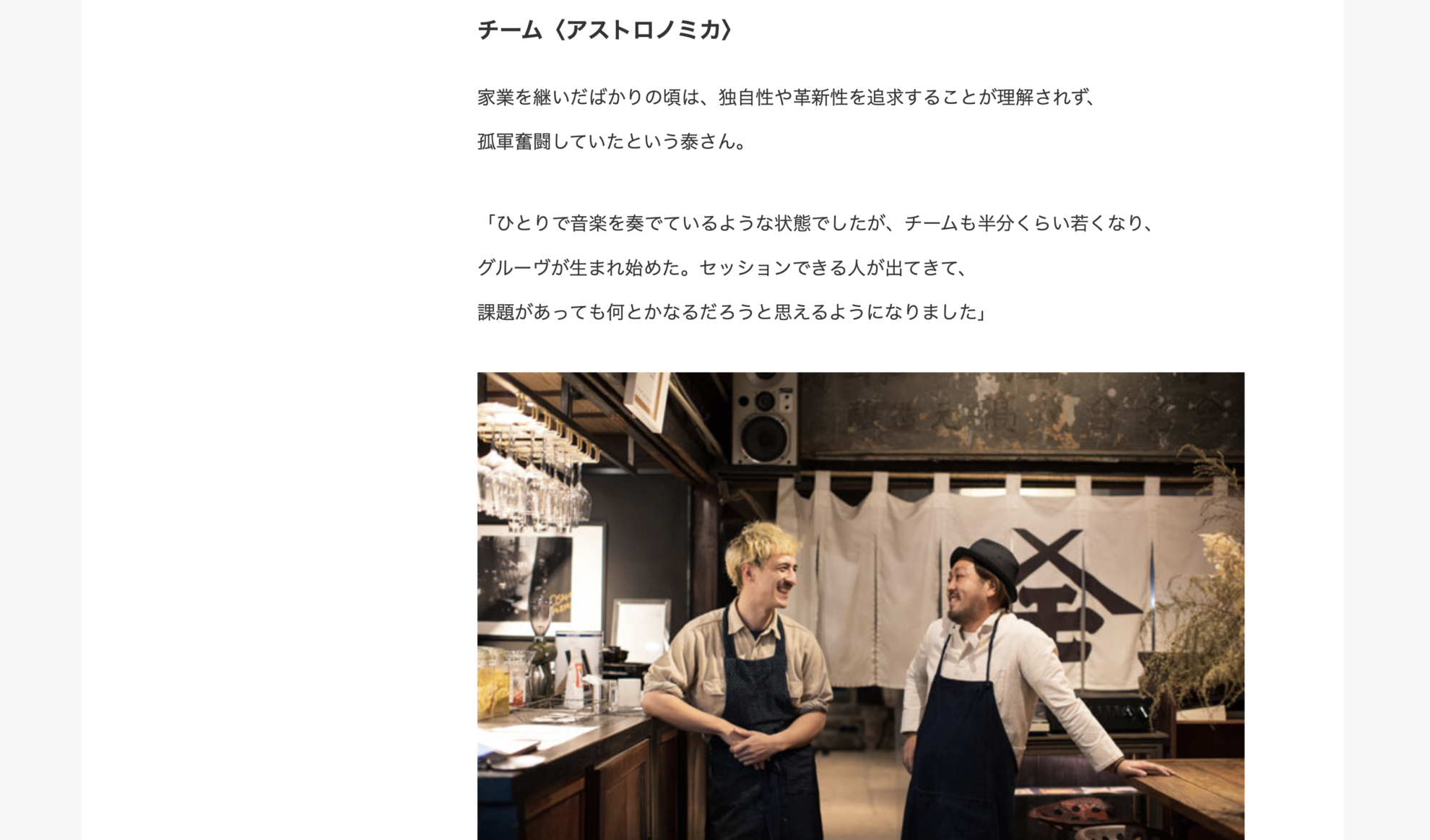
.
チーム〈アストロノミカ〉
家業を継いだばかりの頃は、独自性や革新性を追求することが理解されず、孤軍奮闘していたという泰さん。
「ひとりで音楽を奏でているような状態でしたが、チームも半分くらい若くなり、グルーヴが生まれ始めた。セッションできる人が出てきて、課題があっても何とかなるだろうと思えるようになりました」
メニュー開発を行うシェフふたりが持つ西洋と東洋の感覚に、生産者である泰さんと、研究者の木村さんの視点が加わり、日々実験が繰り返されます。
コースの締めくくりのデザートもチームのアイデアが融合したもの。単品オーダーでも人気のナッツとプラリネを練り込んだ味噌と醤油のジェラートです。
カフェオープン時に泰さんが開発したジェラートに、3年熟成味噌でキャラメリゼしたビターなポップコーンを添えたのはヨナスシェフのアイデア。溶けたジェラートに浸すと、違った食感を楽しめます。
「互いに刺激し合えるいい仲間が増えましたね。研究者の木村さんはもちろん、アーティストや建築家など、ここにいない仲間がもっといるんですよ」と泰さん。ヴィアンヴァーを中心に集まるチームは、菌の世界が夢のある領域としてイメージできるよう、古代ギリシャ語で宇宙を意味する〈アストロノミカ〉と名づけました。
サーヴを行う澤口駿亮さんもチームの一員。泰さんの思いやメニューの特徴を丁寧に伝えます。
佐藤シェフも「髙橋(泰)さん自身がブラディングできる雰囲気を持っているので、それに感化された方が集まってきて、ここでミックスされて新しい発想が生まれるのがおもしろいですね。県外や国外へ行くよりも刺激をもらえる場所なので、そこがすごいと思うし、楽しいです」と話します。
.
Team <Astronomica>
Mr. Yasushi said that when he just took over the family business, he was struggling alone because he did not understand the pursuit of originality and innovation.
“I was like playing music by myself, but the team was about half younger and the groove started to emerge. Some people were able to have a session, and I started to think that I would be able to manage even if there were issues. ”
The Western and Eastern sensibilities of the two chefs who develop the menu are combined with the perspectives of producer Yasushi and researcher Kimura, and experiments are repeated every day.
The dessert at the end of the course is also a fusion of the team’s ideas. Miso and soy sauce gelato with nuts and pralines, which are popular even when ordered individually.
The idea of Chef Jonas was to add bitter popcorn caramelized with miso aged for 3 years to the gelato developed by Mr. Tai when the cafe opened. You can enjoy a different texture by soaking it in melted gelato.
“We have more good friends who can stimulate each other. There are more friends who are not here, such as researchers, Kimura, artists and architects,” says Yasushi. The team gathered around Vianvar named it “Astronomica”, which means the universe in ancient Greek, so that the world of fungi can be imagined as a dream area.
Shunsuke Sawaguchi, who serves, is also a member of the team. We will carefully convey the thoughts of Mr. Yasushi and the features of the menu.
Chef Sato also said, “Since Mr. Takahashi (Yasu) himself has an atmosphere where he can brave himself, it is interesting that people who are inspired by it gather and mix here to create new ideas. Outside the prefecture and abroad. It’s a place that is more inspiring than going to, so I think it’s amazing and fun. “
.
團隊<Astronomica>
泰先生說,當他剛剛接管家族企業時,他獨自一人正在苦苦掙扎,因為他不了解對獨創性和創新的追求。
“我就像一個人玩音樂,但是這個團隊年輕了大約一半,並且開始出現槽路。有些人能夠參加一次會議,而且我開始認為即使有問題,我也能應付自如。 ”
製作菜單的兩位廚師的西方和東方敏感性與生產者泰和研究員木村的觀點相結合,並且每天重複進行實驗。
課程結束時的甜點也是團隊思想的融合。味噌和醬油冰淇淋配堅果和果仁糖,即使單獨訂購也很受歡迎。
喬納斯大廚的想法是,在咖啡館開業時,由泰先生開發的意式冰淇淋中加入用3年陳年味爆米花製成的焦糖味爆米花。將其浸入融化的意式冰淇淋中,即可享受不同的質感。
泰說:“我們有更多可以互相刺激的好朋友。還有更多不在這裡的朋友,例如研究人員,木村,藝術家和建築師。”該團隊聚集在Viamvar周圍,並將其命名為“ Astronomica”,意為古希臘語中的宇宙,因此真菌世界可以想像成一個夢幻的地區。
服務的澤口俊介也是團隊的成員。我們將仔細傳達泰先生的想法和菜單功能。
佐藤大廚還說:“由於高橋先生本人擁有一種可以勇敢面對的氛圍,有趣的是,受其啟發的人們聚集在這裡,並提出了新的想法。在縣內和國外。這是一個這個地方比去那裡更具啟發性,所以我覺得這很有趣。”
.
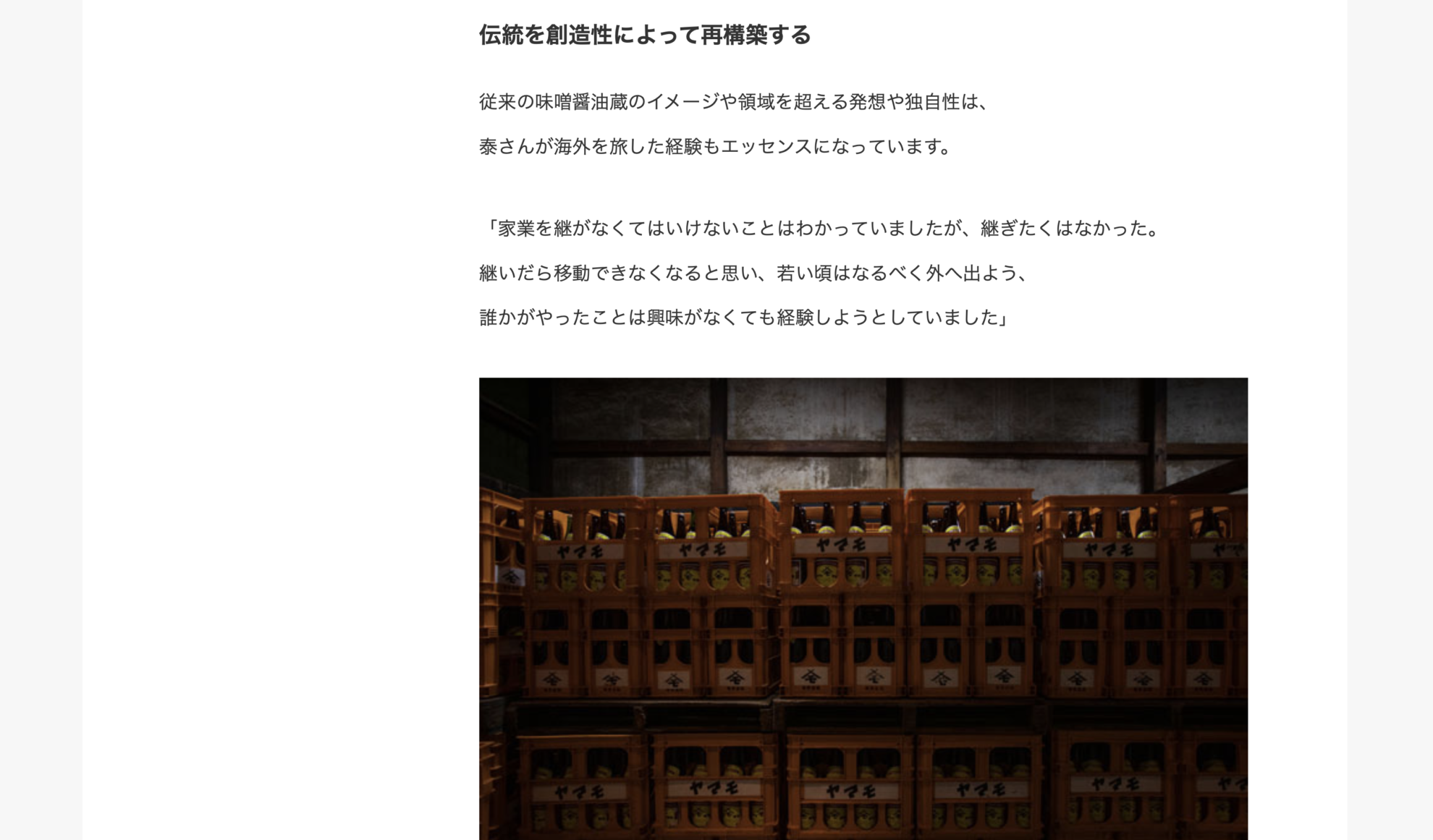
.
伝統を創造性によって再構築する
従来の味噌醤油蔵のイメージや領域を超える発想や独自性は、泰さんが海外を旅した経験もエッセンスになっています。
「家業を継がなくてはいけないことはわかっていましたが、継ぎたくはなかった。継いだら移動できなくなると思い、若い頃はなるべく外へ出よう、誰かがやったことは興味がなくても経験しようとしていました」
150年の伝統を受け継ぎながら、自身の経験や、技術、芸術を取り入れることでオリジナルで、革新的なアイデアを生み出し、仲間とともに次々とかたちにしていく泰さん。
今後も、敷地の奥に位置するもろみ蔵の隣の蔵を飲食空間に、中2階を茶室に、外の蔵をワインの販売所に改装しようと構想中。入り口近くのカフェでは完成された料理、奥の蔵では試験的な料理を提供しようと考えています。
醤油を仕込むもろみ蔵。フルコースに加え、ワインのフルペアリングを申し込むと、ここでの「スターター」から体験が始まります。蔵へと向かう通路から醤油の香りが漂い、早くも料理を味わっているような感覚に。
酵母発酵液に漬け込んだ地元産の皆瀬牛に洋梨とイチジクを練り込んだクリームチーズを合わせたフィンガーフード。同じ秋田の酵母同士のペアリングを提案するため、ルーツのある祖先が見つけた6号酵母のみで酒造りを行う友人の蔵〈新政酒造〉のフルーティな〈No.6〉をもろみ蔵でペアリングします。酵母が降り注ぐ空間で、「旨みをつくり出す」「肉魚をやわらかくする」という酵母の特徴をひと口で味わえる特別な時間です。
「古い建物で味噌醤油をやっている以上、どんなに革新的でも商品にも空間にも『和』はあり続ける。でもほかと似たようなことはやりたくないんです。世界的なエッセンスをどうミックスしてアレンジすると新しくなるかを考えています」
2月にはヴィアンヴァーで仕込むワインも完成予定。世界でも例のない、同一の酵母のみですべての皿と杯をつなぐ日も間近です。流通を改革し、ヴィアンヴァーで醸造する味噌醤油製品を世に送り出すことも見据えています。
熱く、たくましく新しい時代をつくるチームアストロノミカ。今後の展開も楽しみです。
..
Rebuild tradition with creativity
Mr. Yasushi’s experience of traveling abroad is also the essence of the traditional image of miso soy sauce brewery and the ideas and uniqueness that go beyond the realm.
“I knew I had to take over the family business, but I didn’t want to take over. I thought I wouldn’t be able to move if I took over, so when I was young, try to go out as much as possible, even if someone wasn’t interested in what they did. I was trying to experience it. ”
While inheriting the tradition of 150 years, Mr. Yasushi creates original and innovative ideas by incorporating his own experience, technique and art, and forms them one after another with his friends.
He is planning to renovate the warehouse next to the Moromi warehouse located in the back of the site into a dining space, the mezzanine floor into a tea room, and the outside warehouse into a wine sales office. We are planning to serve finished dishes at the cafe near the entrance and experimental dishes at the back warehouse.
Moromi brewery with soy sauce. If you apply for a full wine pairing in addition to the full course, the experience begins with the “starter” here. The scent of soy sauce drifts from the passage leading to the brewery, making you feel as if you are already tasting the food.
Finger food that combines locally produced Minase beef soaked in yeast fermented liquid with cream cheese kneaded with pear and figs. In order to propose pairing between yeasts of the same Akita, we paired the fruity <No. 6> of a friend’s brewery <Aramasa Sake Brewery>, which brews sake only with No. 6 yeast found by an ancestor with roots, at Moromi-Gura. I will. It is a special time where you can enjoy the characteristics of yeast, such as “creating umami” and “softening meat and fish,” in a space where yeast is poured.
“As long as I’m doing miso soy sauce in an old building, there will continue to be” Japanese “in products and spaces, no matter how innovative. But I don’t want to do anything similar. How do you mix the world’s essence? I’m thinking about whether it will be new if I arrange it. ”
Wine to be brewed at Viamver is scheduled to be completed in February. The day when all dishes and cups are connected with only the same yeast, which is unprecedented in the world, is just around the corner. We are also looking to reform distribution and bring out miso soy sauce products brewed in Viamver.
Team Astronomika creates a hot, strong and new era. I am looking forward to future developments.
.
用創造力重塑傳統
泰先生出國旅行的經驗也是味噌醬油啤酒廠傳統形象的精髓,以及超越這一境界的創意和獨特性。
“我知道我必須接管家族企業,但是我不想接管。我以為如果接管我將無法搬家,所以我想在可能的時候盡可能多地外出我還很年輕,即使有人對我所做的事情不感興趣。我也在嘗試體驗它。”
泰先生在繼承150年傳統的同時,結合了自己的經驗,技術和藝術創造了獨具匠心的創新思想,並與朋友們一個接一個地創造了這些思想。
將來,我們計劃將位於站點後面的諸味倉庫旁邊的倉庫改造為就餐空間,將夾層地板改造為茶室,將外部倉庫改造為葡萄酒銷售辦公室。我們計劃在入口附近的咖啡館提供成品菜餚,並在後倉庫提供實驗性菜餚。
醬油諸味啤酒廠。如果您除了完整課程之外還申請完整的葡萄酒搭配,則體驗將從此處的“入門”開始。醬油的氣味從通往啤酒廠的通道中飄出,使您感覺好像已經在品嚐食物了。
一種手抓食物,將用酵母發酵液浸泡的本地生產的皆瀬牛肉與梨和無花果揉成的奶油乾酪相結合。為了建議同一秋田的酵母之間進行配對,我們將朋友釀酒廠<新政酒造株式会社>的果味<No.6>配對,該釀酒廠僅用祖先在諸味蔵發現的6號酵母來釀造清酒。我會。這是一個特殊的時間,您可以在倒入酵母的空間中享受“製造鮮味”和“使肉和魚變軟”等酵母的特徵。
“只要我在老建築中做味噌醬油,無論產品和空間如何創新,在產品和空間中都將繼續存在“日語”。但是我不想做任何類似的事情。世界一流的精髓?我正在考慮,如果我安排了它,它是否會是新的。”
在Viamver釀造的葡萄酒計劃於2月完成。將所有菜餚和杯子都只連接同一酵母的日子即將來臨,這在世界上是前所未有的。我們還希望改革分銷方式,並推出在Viamver釀造的味噌醬油產品。
Astronomica團隊創造了一個炙手可熱的強大新時代。我期待未來的發展。
.
YAMAMO GARDEN CAFE
住所:秋田県湯沢市岩崎124
TEL:0183-73-2902
営業時間:10:00~17:00(16:30 L.O.)
*ランチコースは11:00~15:00で予約制、ディナーコースは金・土・日曜限定の予約制(3日前までに要予約)。
定休日:不定休
.
YAMAMO GARDEN CAFE
Address: 124 Iwasaki, Yuzawa City, Akita Prefecture
TEL: 0183-73-2902 Business hours: 10:00 to 17:00 (16:30 L.O.)
* Lunch course requires reservation from 11:00 to 15:00, dinner course requires reservation only on Friday, Saturday and Sunday (reservation required 3 days in advance).
Regular holiday: Irregular holiday
.
YAMAMO GARDEN CAFE
地址:秋田縣湯澤市岩崎124
電話:0183-73-2902 營業時間:10:00至17:00(16:30 L.O.)
*午餐課程從11:00到15:00需要預訂,晚餐課程僅在周五,週六和周日需要預訂(需要提前3天預訂)。
定期休息:不定期休息
.
